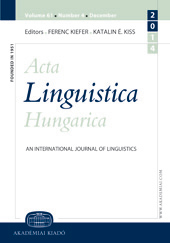Direct and indirect speech in straight-talking Israeli
Direct and indirect speech in straight-talking Israeli
Author(s): Ghil`ad ZuckermannSubject(s): Language studies, Syntax, Semantics
Published by: Akadémiai Kiadó
Keywords: reported speech; Congruence Principle; Hebrew; lexical derivation; Yiddish;
Summary/Abstract: Israeli is currently one of the official languages of the State of Israel. It is a fusional synthetic language, with non-concatenative discontinuous morphemes realised by vowel infixation. This typological paper demonstrates that there is a clear distinction in Israeli between direct and indirect speech. The indirect speech report, which is a subset of complement clauses, is characterized by a shift in person, spatial and temporal deixis. However, unlike in English, the verbs usually do not undergo a tense shift. Israeli has various lexicalized direct speech reports. By and large, Israeli reported speech constructions reflect Yiddish and Standard Average European patterns, often enhancing a suitable pre-existent Hebrew construction.
Journal: Acta Linguistica Hungarica (Since 2017 Acta Linguistica Academica)
- Issue Year: 53/2006
- Issue No: 4
- Page Range: 467-481
- Page Count: 15
- Language: English

